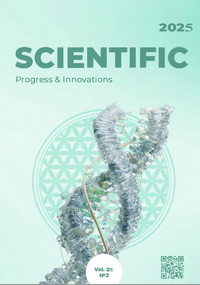Quality indicators of potatoes and their relationship with climatic conditions for ensuring storability
DOI:
https://doi.org/10.31210/spi2025.28.02.01Keywords:
morphological characteristics, biochemical composition, resistance, storage, agronomic practices, drought conditionsAbstract
In the context of a changing climate and increasing demand for high-quality products, studying the quality indicators of potatoes and their relationship with climatic conditions is crucial for ensuring long-term storage and food security. Identifying the optimal climatic conditions for growing potatoes with high storability characteristics will help minimize crop losses and provide consumers with high-quality products throughout the year. The aim of this study is to analyze the quality indicators of potatoes and determine their correlation with climatic conditions affecting tuber storability. Scientific research was conducted during the 2023–2024 period on the territory of a private farm near the city of Poltava (Poltava region). The experiment involved potato varieties of Ukrainian (early-ripening variety Povin) and Dutch selection (late-ripening variety Picasso). An analysis of the climatic conditions during the study period showed that the yield, quality, and storability of potato varieties largely depended on the weather conditions of the growing season. It was found that in 2023, when temperatures were moderate and rainfall was sufficient, potatoes formed fully developed tubers with high mass, dry matter content, and starch concentration. The yield of the Picasso variety reached 31.8 t/ha, while the Povin variety yielded 28.7 t/ha, with storage losses not exceeding 9.4 %. In 2024, due to a critical moisture deficit and abnormally high temperatures, a significant yield decline was recorded: by 31.8 % (Picasso) and 39.7 % (Povin). The tubers lost their standard morphological characteristics, became smaller and deformed. The dry matter content decreased to 21.1 % and 19.5 %, while the starch content dropped to 14.7 % and 13.2 % for Picasso and Povin, respectively. This negatively affected storability, as the storage period was reduced to 5–6 months, and storage losses increased to 13.7 % (Povin) and 9.6 % (Picasso). Notably, the Picasso variety retained satisfactory quality even under the critical growing conditions of 2024, whereas the Povin variety exhibited poor quality, making its successful sale in the fresh market impossible. Practical recommendations on improving cultivation techniques and storage conditions will contribute to enhancing the quality and storability of potatoes.
Downloads
Published
How to Cite
Issue
Section
License
Copyright (c) 2025 Scientific Progress & Innovations

This work is licensed under a Creative Commons Attribution 4.0 International License.

 Creative Commons Attribution 4.0 International Licens
Creative Commons Attribution 4.0 International Licens